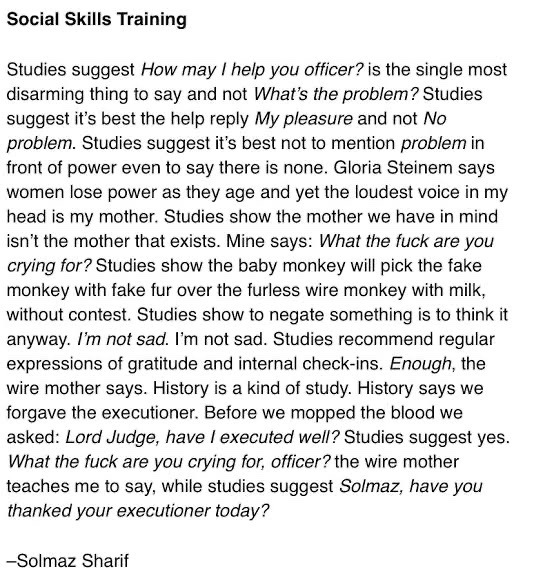#solmaz sharif
Text

Solmaz Sharif, Look: Poems; “Look”
#literature#poetry#solmaz sharif#look#kiss me with your eyes#tender‚ delicate#typography#m#x#id in alt text
4K notes
·
View notes
Text
SOLMAZ SHARIF: I was recently reminded of a story of a political prisoner—I don’t know if I want to share this. . . This political prisoner, who had been convicted and was facing the death penalty, was in a large cell with about twenty other political prisoners. Periodically, the guards would come and call one of their names and take that person out to be executed. When this political prisoner’s name was called, the prisoner stood up and started singing “The Internationale.” The whole cell sang along, and that was their farewell. But when the prisoner went into the hallway, the guards told them that they weren’t going to the gallows. They were being transferred to a different prison. The guards took them to the latrine, and while the prisoner was in there, they realized they wouldn’t have wanted “The Internationale” to be their last song, and started reciting a poem by, I believe, Hafez from memory.
For me, the why of poetry has become the reason revolution must happen to begin with. It’s no longer the conditions that make revolution inevitable, but what’s waiting for us on the other side of it. That required me to be more vulnerable—removing the conceptual frame was an act of that allowed vulnerability. . .
ALINA STEFANESCU: That reminds me of how my parents made me memorize poetry. They said: If you find yourself in prison, if you lose your home, family, livelihood, everything, the poems you remember will keep you whole. At the end of the day, alone in a cell, no one can steal the stanzas you remembered. The recitation itself is a radical act of refusal. Maybe poems sustain the hope and selfhood that carceral systems aim to extinguish.
SOLMAZ SHARIF: I love that. I was reminded of poetry’s capacities at the beginning of the pandemic. When lockdown started, some of my artist friends who work in other mediums suddenly couldn’t do any work. I remembered, for readers a poem is something you can carry with you anywhere, and for poets, writing a poem is an action that you can undertake anywhere. You don’t need physical materials. I hadn’t decided to turn my attention toward those qualities, however; I was forced to. My idea of poetry is tied inextricably to my early understanding of carcerality and war—both of which evaporate all that seems solid. And poetry seems especially able to survive these things. I bristle at the word hope, but the poem’s scrappy thereness is enough for me. In an interview late in his life, Mahmoud Darwish says, “poetry changes only the poet.” Some people understand that statement as pessimistic or cynical or jaded. Or maybe see it in line with Auden’s choppily quoted “poetry makes nothing happen”—a quote betrayed in the two words that follow: “it survives.” Auden is often quoted to fall neatly into that neoliberal ethical bypass of so much American literature. But I see the Darwish quote as honoring that even when a poem can’t be anything else, that it will be enough. I’m surprised by this turn in my own work, but the lived practice of poetry in my life made it inevitable.
— Solmaz Sharif and Alina Stefanescu, in conversation for BOMB Magazine
#maybe poems sustain the hope and selfhood that carceral systems aim to extinguish !#w#interview#solmaz sharif#all beautiful poetry is an act of resistance
276 notes
·
View notes
Text
"Solmaz, have you thanked your executioner today?"
Read it here | Listen to the author read it here
Reblog for a larger sample size!
#open polls#polls#poetry#poems#poetry polls#poets and writing#tumblr poetry#have you read this#social skills training#solmaz sharif#police brutality#abuse of power#institutionalized racism
14 notes
·
View notes
Text
A lover, once: You can’t say every action is political. Then the word political loses all meaning.
He added: What is political about this moment?
I was washing his dishes. I had left the water running.
—Solmaz Sharif
26 notes
·
View notes
Text
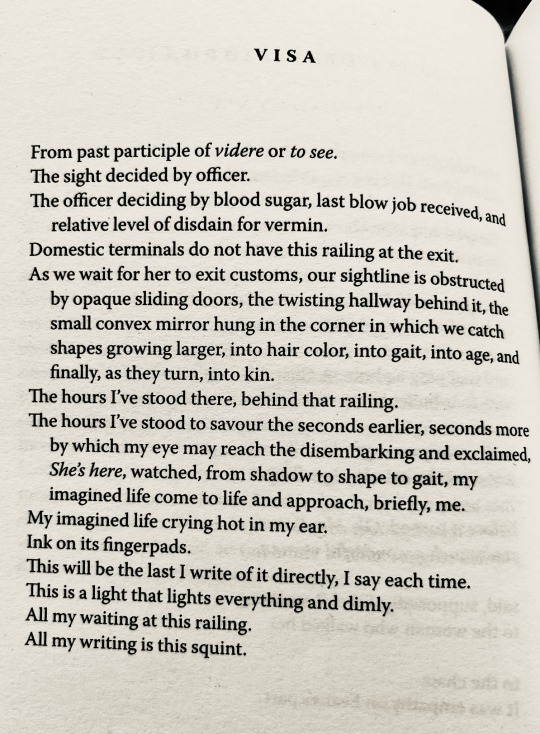
Solmaz Sharif, from Customs
47 notes
·
View notes
Text
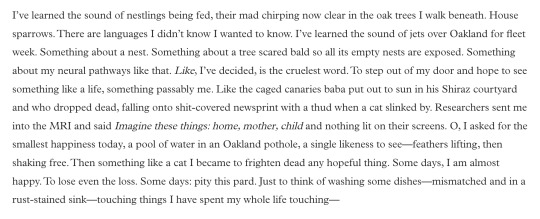
civilization spurns the leopard by Solmaz Sharif
18 notes
·
View notes
Text
No crueler word than return.
No greater lie.
The gates may open but to return.
More gates were built inside.
— Solmaz Sharif, from “Without Which,” Customs: Poems
360 notes
·
View notes
Text
my mother tape-records my laugh to mail bubblewrapped back home
my mother records me singing Ye shabe mahtab mah miad to khab
I am singing the moon will come one night and take me away side street by side street
sitting on a pilled suburban carpet or picking blue felt off the hand-me-down couch
the displaced whatnots
I practice the work of worms
how much I can wear away with no one watching
two generations ago my blood moved through borders according to grazing seasons
then a lifeline of planes
planes fly so close to my head filled with bomblets and disappeared men
scaffolding sprouts nooses sagging with my dead
I burn my finger on the broiler and smell trenches
Drone, by Solmaz Sharif, in the poetry collection Look. First published in Blackbird.
Her first poetry collection, Look
In her 2016 debut collection, Look, Sharif—who was born in Istanbul to Iranian parents and grew up in the United States—refused American civil rituals of polite consensus and exposed the ways state violence takes place in and through language.
Reappropriating terms from the Department of Defense’s Dictionary of Military and Associated Terms, where ordinary English is redefined in service of statecraft, Sharif mapped empire’s brutal trespasses. These words appear in the poems in capital letters, simultaneously disrupting and constructing scenes—often intimate and domestic. In the title poem, for example, the DoD’s definition of “look” (“a period during which a mine circuit is receptive of an influence”) jostles the ordinary one: “Let me LOOK at you. // Let me LOOK at you in a light that takes years to get here.” As the eerie convergence between the militarized and the quotidian agitates the language, any pretense of neutral description falls away. Reading these poems, it is impossible to sustain the fiction of a relationship—including a readership—wholly bracketed from the world empire has made.
Solmaz Sharif wrestles with the ways that acclaim can become an imperial enclosure; I once heard her say, “I try to write poems that make it impossible to applaud afterward.” Reaching toward forms of relation that are not fully apprehensible from life in the metropole, her work rejects the embrace of any we for whom sharing is an uncomplicated act.
5 notes
·
View notes
Text
"Only weeks ago, we commemorated the thirteenth anniversary of our crushed Egyptian revolution. I remember the sting of tear gas, the crack of bullets, the fallen martyrs, and the child straddling his father’s neck, chanting, “‘Aish, hurreyya, ‘adala igtama’eyya!”—bread, freedom, social justice.
What I also remember: when millions of Egyptians took to the streets, toppling decades of oppression, the first focal point their eyes turned to was Palestine.
I remember Tahrir Square brimming with Palestinian flags as millions pledged allegiance to their colonized kin. I remember protesters storming the colonizer’s embassy in Cairo, a young man, Ahmed El-Shahhat, scaling the wall, tearing down and burning the colonizer’s flag, and hoisting Egypt’s in its stead—and the crowd below roaring. I remember 2012, when the Rafah border flung open, and a tide of Egyptian convoys and activists ebbed and flowed, standing shoulder-to-shoulder with their Palestinian siblings amid the bombardment.
I remember all of this, and I remind myself every day: the obliteration of our revolution—on the streets of Egypt, in the hearts of Egyptians, and in future generations—was imperative for the empire. It would have rendered endeavors like the ongoing genocide unfeasible, so it had to be quashed and its history eradicated. I remind myself: our liberation and that of the Palestinians are inextricable."
3 notes
·
View notes
Text

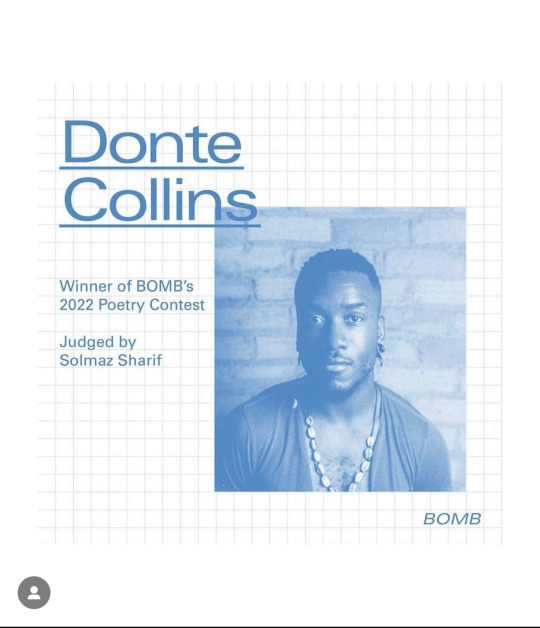
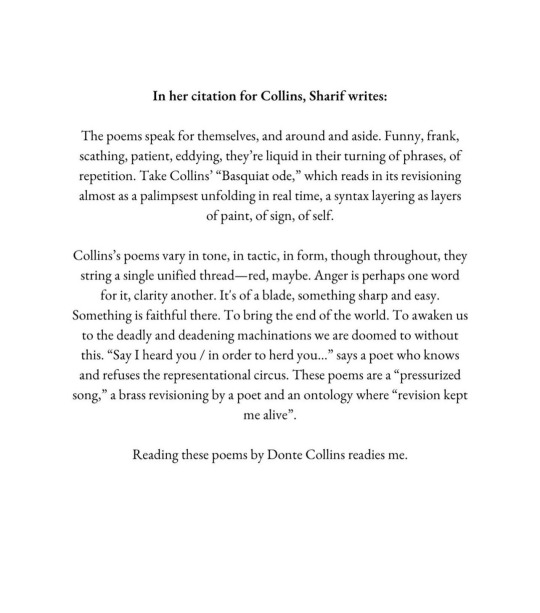
BOMB is honored to announce the winner of our 2022 Poetry Contest: Donte Collins! Guest judge Solmaz Sharif selected this year's winner, who will receive a $1,000 prize and will be published in our Fall 2022 issue.
In her citation for @dontecollinsthepoet , Solmaz Sharif writes, "The poems speak for themselves, and around and aside. Funny, frank, scathing, patient, eddying, they're liquid in their turning of phrases, of repetition.. Reading these poems by Donte Collins readies me."
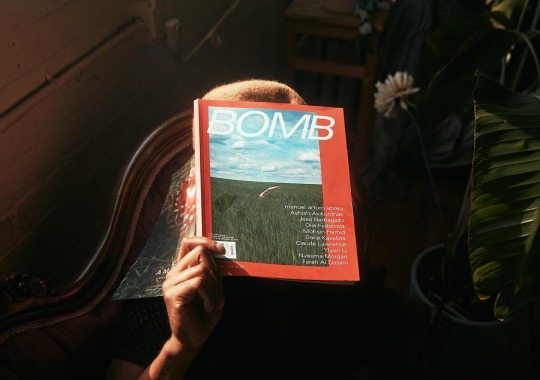
36 notes
·
View notes
Text
the echo of what
I've never called you.
Solmaz Sharif, Look; “Personal Effects”
190 notes
·
View notes
Text
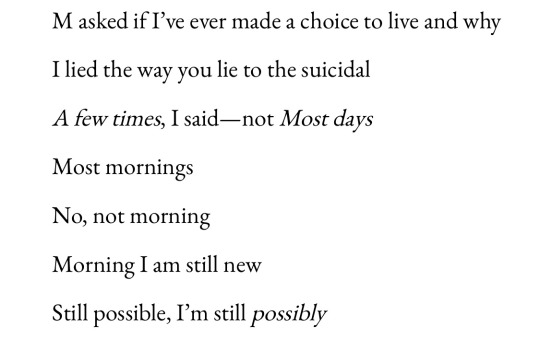
Solmaz Sharif, from “Beauty,” in Customs [ID in ALT]
2K notes
·
View notes
Text

Customs, Solmaz Sharif
868 notes
·
View notes
Text
"He, Too" by Solmaz Sharif / Immigration Men by Salman Toor
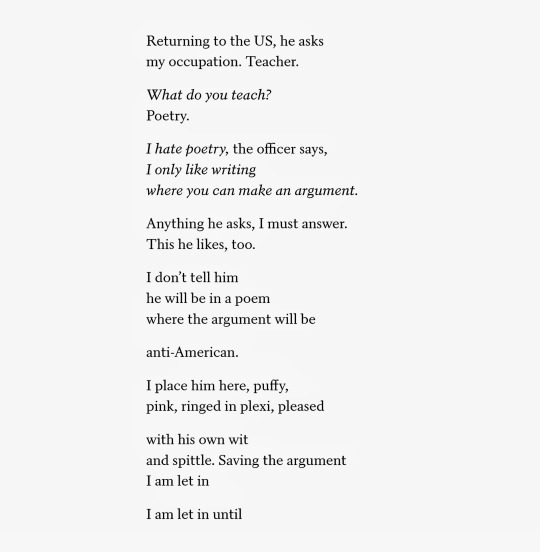
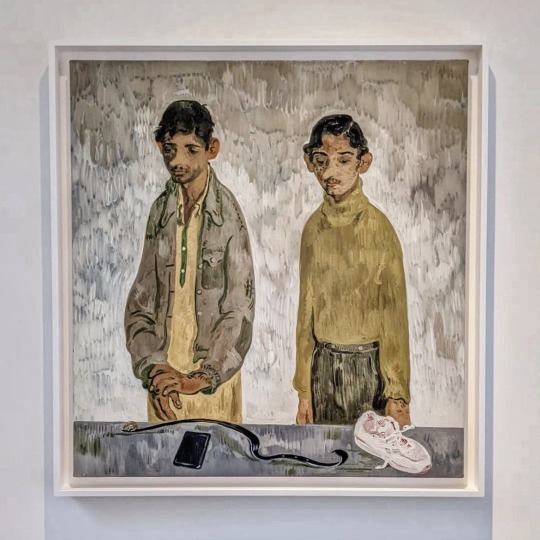
28 notes
·
View notes
Quote
It is, snarling, what I carve of it alone.
Solmaz Sharif, from “Deception Story”
17 notes
·
View notes
